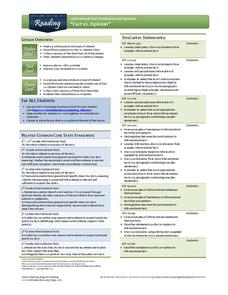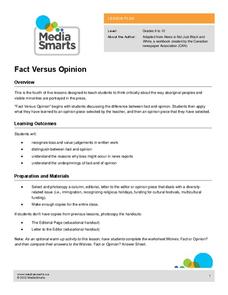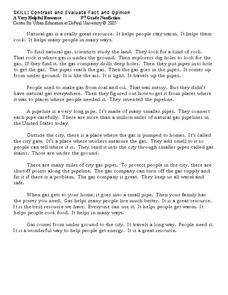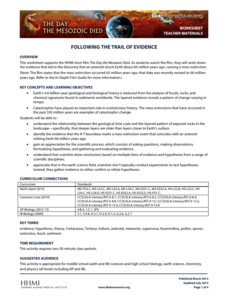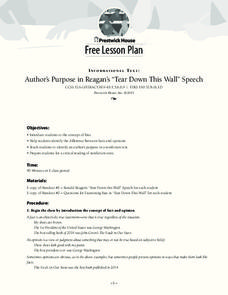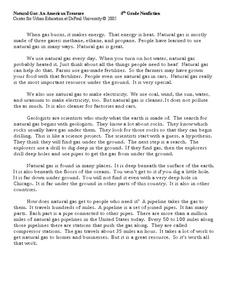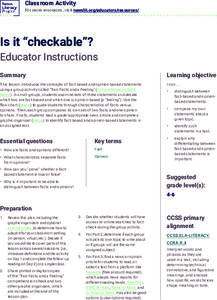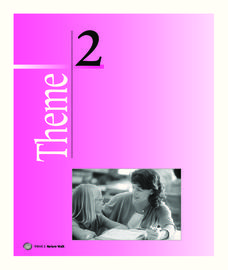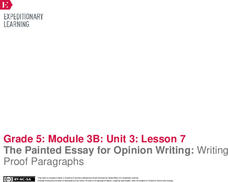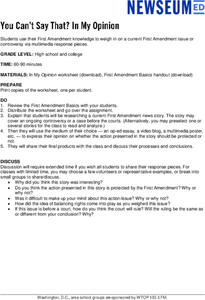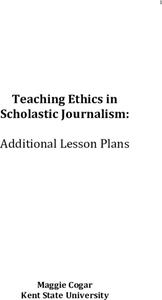Florida Center for Reading Research
Comprehension: Text Analysis, Fact or Opinion Football
Touchdown! Try out this game to help your learners differentiate between fact and opinion. In pairs, pupils switch off reading cards to one another. Learners determine if the sentences on the cards are facts or opinions and continue...
Florida Center for Reading Research
Fact Versus Opinion
Is that a fact or an opinion? Learners explore the difference using this pocket chart activity during which partners read statement cards and determine whether they are facts or opinions.
The New York Times
News and News Analysis: Navigating Fact and Opinion in the Times
Help your class understand the difference between fact and opinion by exploring the New York Times homepage and articles. In pairs or small groups, pupils complete a scavenger hunt, answering the provided questions. Next, discuss the...
For the Teachers
Fact vs. Opinion
Many informational texts are written as factual, but can your learners determine when an opinion is presented as fact? Have your kids read several articles on the same topic and record the statements that contain either facts or...
Media Smarts
Fact versus Opinion
Part of a series aimed at breaking down cultural bias from the Canadian Media Awareness Network, this activity identifies where opinions do and don't belong in a newspaper. Pupils review handouts about the purpose of editorial comments...
Curated OER
Build Mastery: Fact and Opinion
Is it a fact or an opinion? Get your kids up and moving during this reading comprehension activity. They listen to you read a book or passage (consider writing something yourself to get the ideal text), listening for facts and opinions....
University of the Desert
Fact and Opinion within the Media
How can the media foster cultural misunderstandings? These activities encourage learners to distinguish between fact and opinion in the media
DePaul University
Contrast and Evaluate Fact and Opinion
Looking for a resource that helps learners practice identifying fact and opinion? A four-page worksheet includes two informational text reading passages. Pupils read each passage and respond to four multiple choice and one short answer...
PBS
Facts vs. Opinions vs. Informed Opinions and their Role in Journalism
Do reporters write about what they see, or what they think? Examine the differences between investigative writing and opinion writing with a lesson from PBS. Learners look over different examples of each kind of reporting, and convince...
News Literacy Project
Fact-Check It!
Here's a lesson designed to help learners develop their digital verification skills. First, expert groups study specific digital verification skills, and in a jigsaw activity, share what they have learned with classmates. The jigsaw...
Howard Hughes Medical Institute
Following the Trail of Evidence
One important skill in analyzing scientific evidence is identifying facts versus opinions. Scholars identify pieces of evidence from the film The Day the Mesozoic Died and then discuss this evidence in small groups at the end of each act...
Curated OER
Writing a News Article
Join the newspaper business with a series of lessons and exercises focused on elements of journalism. The packet focuses on distinguishing fact from opinion, writing effective headlines, sequencing events, and editing and proofreading a...
Nasher Museum of Art at Duke University
Are You My Mother? An Opinion Writing Unit
During a five-day lesson, scholars analyze written and visual art—primarily the poem, Mother to Son by Langston Hughes— identify facts, and write opinions. Learners read the poem several times, discuss, write, compare and contrast, and...
EngageNY
Identifying Author’s Opinion and Evidence: The Value of Sports in People’s Lives, Part II
Context matters! Using the intuitive resource, pupils decipher context clues to determine the meaning of unknown words from an informational text. Also, in small groups, they practice identifying the author's opinion and supporting...
Prestwick House
Author’s Purpose in Reagan’s “Tear Down This Wall” Speech
President Ronald Reagan's "Tear Down This Wall" speech, delivered on June 12, 1987 before the Berlin Wall, provides class members with an opportunity to examine three key aspects of informational text: author bias, the use of facts and...
Curated OER
Natural Gas: An American Treasure
Do your fourth graders need extra practice with evaluating fact and opinion? An informative resource provides two reading passages in which learners distinguish sentences as fact or as opinion. Additionally, they determine how the...
News Literacy Project
Is It “Checkable”?
Upper elementary scholars test their checking skills with a lesson that challenges them to distinguish between fact and opinion. First, the class takes part in a discussion regarding a helpful flow chart. Next, learners follow the flow...
Newseum
Weighing the Arguments
To understand how personal perspectives can affect policy and politics, scholars examine the woman suffrage media map and historical artifacts to analyze arguments for and against women's suffrage. Class members then take on the role of...
Houghton Mifflin Harcourt
Nature Walk: Extra Support Lessons (Theme 2)
Reinforce concepts such as long vowels, spelling patterns, sound clusters, double-final consonants, and syllables with a nature-themed unit. Through a series of extra support lessons, learners compare and contrast using a Venn diagram,...
EngageNY
The Painted Essay for Opinion Writing: Writing Proof Paragraphs
It's time to proof read! Pupils read and analyze proof paragraphs from a model essay. They then practice writing their own proof paragraphs to express an opinion about offshore oil drilling.
Newseum
You Can’t Say That: In My Opinion
As a part of a study of the First Amendment, high schoolers research a current news story that seems to involve one of the freedoms granted by the First Amendment. Investigators decide whether they think the action presented in the story...
The New York Times
Evaluating Sources in a ‘Post-Truth’ World: Ideas for Teaching and Learning about Fake News
The framers of the United States Constitution felt a free press was so essential to a democracy that they granted the press the protection it needed to hold the powerful to account in the First Amendment. Today, digital natives need to...
Kent State University
Teaching Ethics in Scholastic Journalism
Events in recent years have underscored the importance of a free and independent press in a democracy. Young journalists engage in lessons about the function of journalism in a democratic society, practice the steps of Bok's Ethical...
Curated OER
Scapegoating and Othering
Scapegoating and "Othering" is the focus of a series of activities that ask groups to consider how these behaviors contribute to hatred and intolerance. Groups are given a scenario and discussion questions based on the situation. Whether...
Other popular searches
- Free Facts or Opinions
- Facts and Opinions Book
- English Facts and Opinions
- Biology Facts and Opinions
- Facts and Opinions for Reading
- Reading Facts and Opinions





